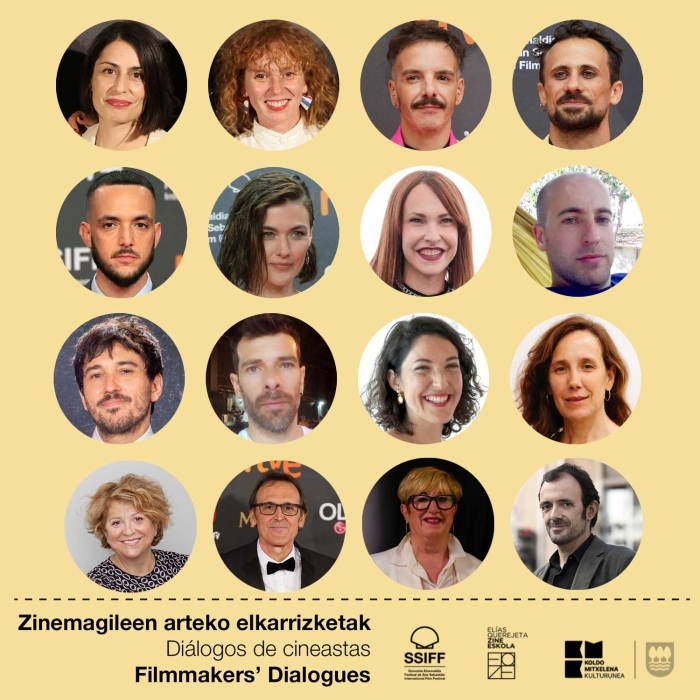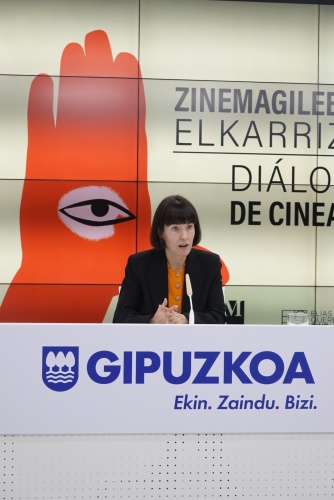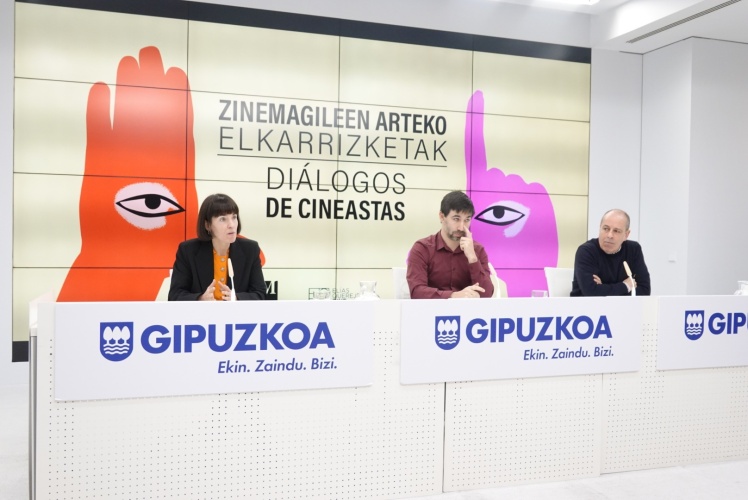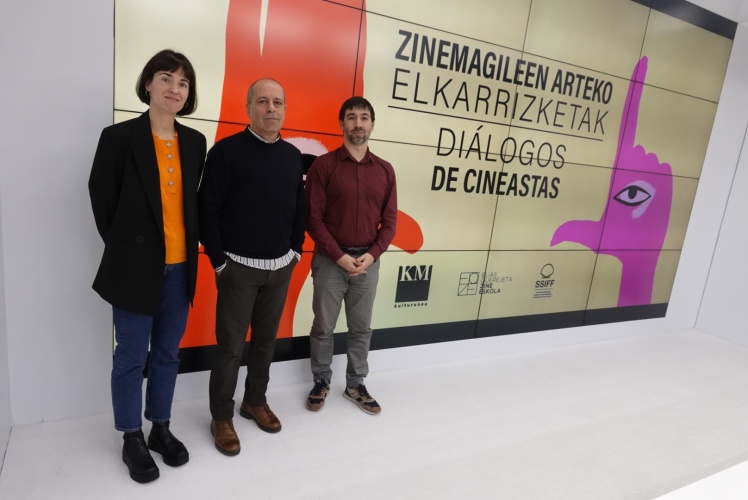The meeting between Maria Elorza and Marian Fernández will open the fourth year of the season on 14 January
This morning, Gipuzkoa Provincial Council’s Department of Culture joined the San Sebastian Festival to present the fourth edition of Filmmakers’ Dialogues, a series of eight talks with the participation of 16 specialists from the world of film. Thus, the talk between producer Esther García and composer Alberto Iglesias, and the get-together between moviemaker Helena Taberna and writer Isaac Rosa join the meetings already announced between Maria Elorza and Marian Fernández, to open the season on 14 January; Paula Ortiz and Javier García Arredondo; Celia Rico and María Vázquez; Javier Giner and Oriol Pla; Pedro Martín-Calero and José Tirado, and Marta Nieto and Antón Álvarez (C. Tangana). Filmmakers’ Dialogues is a proposal organised by the Provincial Council’s Koldo Mitxelena Kulturunea (KMK) service in conjunction with the San Sebastian Festival’s all year round initiative, Z365, and the Elías Querejeta Zine Eskola (EQZE).
The Director General of Cultural Promotion and Youth, Isaac Palencia, highlighted that “the purpose of the season is to draw attention away from the sole focus on the filmmaker in order to highlight the other professions involved in developing a project: from the screenplay to directing actors and including editing, art and production along the way. This is also why it was also approached as a discussion for two, between the moviemakers and their regular collaborators in the different disciplines”. This is also why, added Palencia, “the idea was to broaden the focus and address the movie-loving public who want to learn and discover more about the cinema purely for their enjoyment, to obtain greater tools and knowledge. Thus, Filmmakers’ Dialogues becomes yet another essential piece in the audiovisual ecosystem to which the Department of Culture is committed, joined by the self-same Elías Querejeta Zine Eskola, the roll-out of grants to the sector, and the Crossover festival dedicated to analysing the phenomenon of series, among others”.
For her part, Maialen Beloki, Deputy Director of the San Sebastian Festival, added that this course has offered a “unique opportunity” to collaborate with the Koldo Mitxelena Centre and the Elías Querejeta Zine Eskola in the endeavour to “complete and share” this rundown of the year’s Basque and Spanish films. “Yet again, the people of Gipuzkoa will have the opportunity to enjoy a programme revealing the processes involved in creation from a more unusual angle”, she stressed.
The season’s eight meetings will congregate almost twenty film professionals in the Santa Teresa Convent in San Sebastian’s Old Town. All of the sessions are open to the public; however, there is also the option of signing up free of charge for the full season, whereby those who register will receive the publication on the Festival retrospective, as well as two invitations per person for some of the Official Selection screenings at the Velodrome. Registration will also allow participants to reserve places in the workshops running at the Elías Querejeta Zine Eskola, as well as giving them entry to screenings and talks at the Crossover Festival.
2025 Programme
In June, on a date as yet to be decided, Esther García and Alberto Iglesias will discuss their long and fruitful participation, as producer and composer respectively, in a large number of projects directed by Pedro Almodóvar with his El Deseo production company. Their latest collaboration was on The Room Next Door, shown this year as a special screening to accompany the Donostia Award going to Almodóvar.
On 14 January, the first meeting of the year, Producing non-fiction, will take the shape of a talk between the director Maria Elorza, and her regular producer, Marian Fernández, with whom she is currently working on the Caro Bastiano / Dear Bastiano, selected this year for the Ikusmira Berriak residencies programme and winner of the Sideral Award. The two also worked together on A los libros y a las mujeres canto / To Books and Women I Sing (2022), which landed a special mention from the Irizar Basque Cinema Award and the Youth Award in San Sebastian.
This edition will come with two events related to Literary Adaptations. On the one hand, on 11 February, will be the meeting between the writer Isaac Rosa and the director Helena Taberna, who recently made a film based on the novel Final Feliz, with the title of Nosotros. Other of Rosa’s works have also been taken to the big screen, such as El país del miedo (Francisco Espada, 2015) and La mano invisible (David Macían, 2016), while the moviemaker from Navarre has participated in the San Sebastian Festival with films including Yoyes (2000) and La buena nueva /The Good News, programmed in Made in Spain, as well as Acantilado / The Cliff and Varados / Stranded (2019), shown in Zinemira.
On the other hand, the director Paula Ortiz, who participated out of competition in the Official Selection with the special screening of La virgen roja / The Red Virgin, will talk on 7 March with the screenwriter Javier García Arredondo, with whom she has worked on titles such as La novia / The Bride (Zabaltegi, 2015) and Teresa (2023), based respectively on Federico García Lorca’s Bodas de sangre, and Juan Mayorga’s La lengua en pedazos.
On 27 March, Actors direction will be the subject of the meeting between the director Celia Rico and the actress María Vázquez, the protagonist of her second film, Los pequeños amores / Little Loves (Made in Spain, 2024), winner among others of the Silver Biznaga Special Jury Prize at the Malaga Festival. With her first feature film, Viaje al cuarto de una madre / Journey to a Mother’s Room (New Directors, 2018), Celia Rico carried off the Youth Award and received a special mention from the New Directors Award.
Interpreting autofiction is the title of the talk scheduled for 10 April between Javier Giner, co-director of Yo, adicto / I, Addict, and the actor Oriol Pla, star of the series shown out of competition as an Official Selection special screening. Pla precisely plays the real person on which the series is based, Javier Giner, who took his book of the same name to make his directorial debut.
With the title of Art direction and production design, filmmaker Pedro Martín-Calero, who made his feature debut with El llanto / The Wailing, winner of the Silver Shell for Best Director exaequo, will join the art director José Tirado to discuss their work on 15 May. The latter has experience in works including As bestas / The Beasts (Rodrigo Sorogoyen, Perlak, 2022), winner of the City of Donostia / San Sebastian Audience Award for Best European Film, and Teresa (Paula Ortiz, 2023).
On 29 May, in the session on New filmmakers and other disciplines, the actress Marta Nieto, who made her debut behind the camera at the Seminci with La mitad de Ana (2024), will talk to Antón Álvarez (C. Tangana), the musician whose first work as a director, La guitarra flamenca de Yerai Cortés, earned him a special mention from the Kutxabank-New Directors Jury.
Registration open from tomorrow
Tomorrow, 10 December, from 10:00, a registration form will be available on the Koldo Mitxelena Kulturunea website on which to sign up for the Filmmakers’ Dialogues. Places will be assigned on a first-come-first-served basis.
The course will have a strong educational slant, offering attendees the option of formal registration which, as well as attendance of the events making up the programme itself, will also give them access to a complementary programme of workshops, meetings and other educational initiatives. Registration is free of charge and is open to all locals, from students to film buffs. To encourage physical attendance of the events and stress their character of meeting place, the sessions will not be streamed. However, they will be recorded and available for viewing on the Koldo Mitxelena and San Sebastian Festival websites at the end of the season.
Filmmakers 2025
- 14 January. Producing non-fiction: Maria Elorza and Marian Fernández.
- 11 February. Literary adaptations: Helena Taberna and Isaac Rosa.
- 7 March. Literary adaptations: Paula Ortiz and Javier García Arredondo.
- 25 March. Actors direction: Celia Rico and María Vázquez.
- 10 April. Interpreting autofiction: Javier Giner and Oriol Pla.
- 15 May. Art direction and production design: Pedro Martín-Calero and José Tirado.
- 29 May. New filmmakers and other disciplines: Marta Nieto and Antón Álvarez (C. Tangana).
- June. Production and music: Esther García and Alberto Iglesias.
The Filmmakers’ Dialogues will continue to run at the KMK, in its Santa Teresa Convent hub, in San Sebastian’s Old Town, where the sessions will start in the function room at 19:00.








